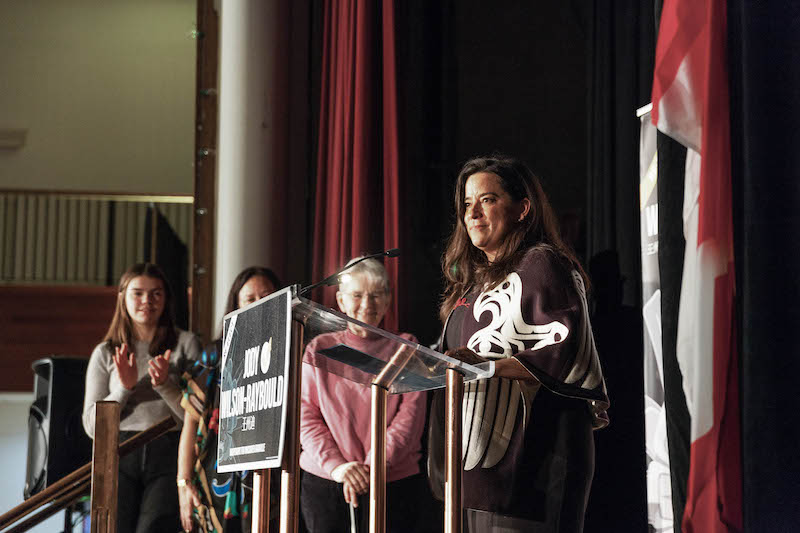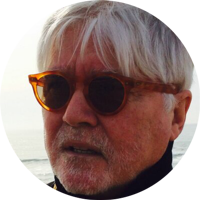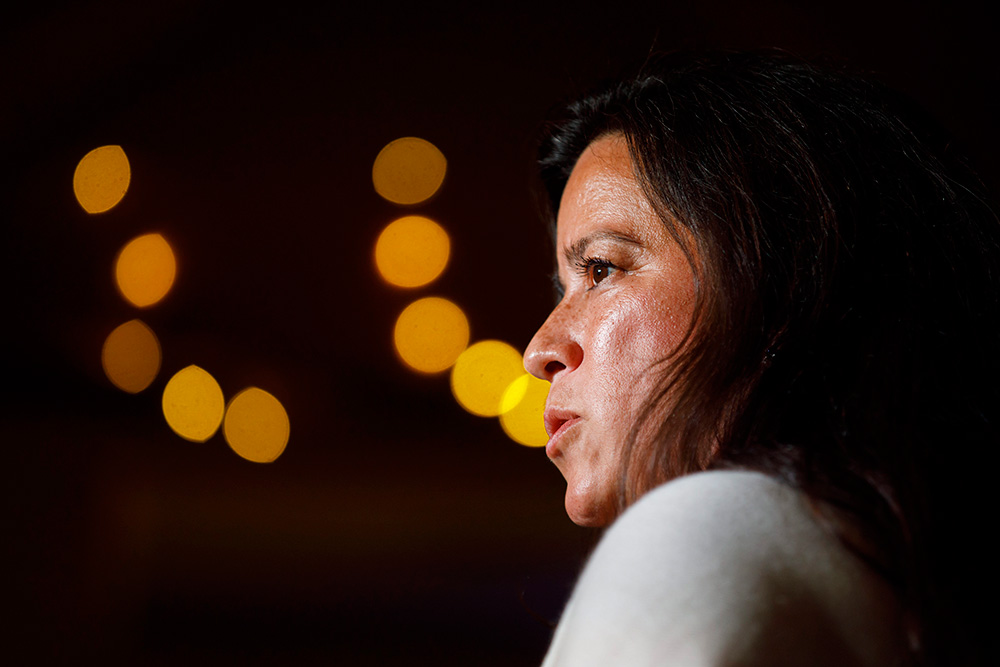When you ride the roller coaster, sometimes you crash. Just ask Jody Wilson-Raybould.
The woman who grew up on Vancouver Island, whose spirit was formed on Cape Mudge, landed in Ottawa as Canada’s first Indigenous justice minister and attorney general. It was a dream journey accomplished in jig time.
But instead of being the beginning of something even bigger, 2019 turned into the most tumultuous and transformative year of her life.
In what seemed like a heartbeat, Wilson-Raybould went from being a star cabinet minister and potential future Liberal leadership candidate to an outcast, spurned by her leader and most of her former colleagues. Out of the caucus and out of the party, and then elected as an Independent MP.
And all because in the collision of personal principle and prime ministerial power, the latter conditionally won the day. By any standard, it has been a bumpy ride.
“Roller coaster is a good way to describe it,” Wilson-Raybould told The Tyee. “Over the past year and a bit, I have gone through a whole range of emotions — sadness to happiness. I was so pleased when I was elected in 2019, because it sent a message to Ottawa. It said ‘we can do politics in a better way.’ The people of Vancouver-Granville said that with their votes. There has also been happiness from being free to engage with people in other parties. I embrace that. But as happy as that made me, there is great loneliness in the political space I now occupy. I am sad to be there without Jane, because we would have done great things together.”
Wilson-Raybould found out from the media that former Liberal cabinet minister Jane Philpott had lost her bid for re-election. Philpott had resigned over the same issue that prompted Wilson-Raybould to leave the cabinet — Prime Minister Justin Trudeau’s interference in the SNC-Lavalin criminal case.
That interference was documented and denounced by Canada’s ethics commissioner. But it wasn’t enough to send Philpott, who represented Markham-Stouffville, back to Parliament.
“I did speak with her that night. We were watching TV and saw the numbers coming back. Of course, we didn’t like what we were seeing. Jane and I were messaging back and forth, as were our campaign managers. I told her I would call later. I won later, and made a point in my victory speech of saying how extraordinary Jane is. We had a victory party in Granville, and I called her fairly late when it was over. All I can tell you is that she was quite upset.”
So why did Wilson-Raybould win and Philpott lose?
“We had a really different experience in Vancouver-Granville, and a real spectrum of supporters for our campaign. People came to us who demand integrity in public life, and who don’t want the old way of doing things. The people in Markham-Stouffville didn’t see it that way. They have lost one of the best ministers of the Crown this country has ever had — a principled, hardworking, compassionate human being, who was in politics for all the right reasons.”
Without her friend at her side, Wilson-Raybould’s return to Ottawa was decidedly chilly. There were no congratulations, explanations or even recognition from the prime minister. To their credit, a few of her former Liberal colleagues, like cabinet minister Joyce Murray, saluted Wilson-Raybould’s victory. Class.

After the frosty return came the dustup over her office. Wilson-Raybould wanted to keep her former office, but in the end had to surrender it for more modest quarters.
She felt the news stories, in her view obviously leaked by the Liberals, made her look like the entitled and difficult person they had conjured up during her confrontation with the prime minister over SNC-Lavalin.
“House administration was treating me fairly. They told me on two occasions I was able to stay in my old office. The story about this wasn’t fair. They made it sound like it was against the rules to even ask questions on procedure, which is all I did. I could have communicated better when I spoke to the CBC, but what I said was amplified. It reminded me of other stories I had been seeing for a year smearing me. I don’t care one bit about the size of my office. I have more important things to do in Ottawa.”
One of those things is to move the ball down the field on the issue of reconciliation with First Nations. Wilson-Raybould acknowledges that “things are improving,” but said the government has offered too many excuses for not dealing with the big issues on this file.
“I wish more had been done in the last government,” she said. “But the big issues absolutely require political leadership. It’s not enough to say these matters are too complicated or too hard to resolve. We all have to remove our partisan hats and address the land issue, and the inherent Indigenous title to the land. We must come up with a new rights-recognition framework, one that deconstructs the colonial legacy. The law and morality are more important than politics in this matter.”
As for the RCMP’s apparent conclusion that it is entitled to use lethal force and snipers on pipeline protesters, including First Nations people, the former justice minister was blunt.
If the story published in the Guardian is true, “there needs to be big changes and a lot of internal reflection inside the RCMP,” she said. After a pause, she added, “That is certainly not the country I think I am living in.”
(For the record, the RCMP issued a non-denial denial. The story, the force said, was “unsubstantiated, incomplete and inflammatory.”)
Trudeau has laid out his vision of what the country should be, both in the recent speech from the throne and the mandate letters he issued to his new cabinet ministers.
Wilson-Raybould found the throne speech mostly aspirational without much working detail. After reading the mandate letters, she has some solid reservations.
“I have concerns around climate change coming out of Madrid. I would like to see more ambitious emission targets with legislation to back them up so that we can actually meet them. I think an all-party committee should be struck to hold the government to account. All parties need to step up.
“On justice, we need to remove the vast majority of mandatory minimum penalties, create some specialized courts, and move more aggressively toward restorative justice.”
“On Indigenous issues, I am happy the government committed to legislating the UN [Declaration on the Rights of Indigenous Peoples], but the time frame also matters. I hope that happens this year. So much of the coming year depends on leadership. It will take leadership to change the laws and policies for Indigenous peoples. It will take leadership to bring in single-payer, national pharmacare.”
“Despite my misgivings, I voted for the supplementary estimates to give the government the money they need. When the PM talks about being more co-operative, I just hope he actually believes that, rather than just saying it to get re-elected.”
For her own part, Wilson-Raybould has already drafted private member’s legislation touching on some of the topics above, including reducing the number of mandatory minimum sentences, more ambitious emission targets in fighting global warming and changes to the Standing Orders of the House of Commons.
The bad news? She is 78th in line to bring her private member’s legislation forward in the new Parliament. Even so, she has a battle plan.
“I will be working with the Green party and Independent senators to get this bill through. The great advantage of my Independent status is that I can work with anyone I want. That is very liberating.”
The case that changed Wilson-Raybould’s career path and Trudeau’s political fortunes was concluded on Dec. 20.
SNC-Lavalin entered a guilty plea to a fraud charge and was sentenced to a $280-million fine and three years probation.
The charge that would have kept the company from bidding on government contracts for 10 years, corruption of a foreign official, was dropped. It all went down without interference from the Prime Minister’s Office. On the face of it, except for the PM’s political meddling, the whole SNC-Lavalin scandal need not have happened.
“A lot of people are talking about the $280-million fine and three years probation, the fact that the court process and rule of law was able to unfold without political interference,” Wilson-Raybould said. “And this is the way it should have happened in the first place.”
And what about that crucial bribery charge that was dropped? Could that have been political influence coming in quietly through the back door?
“I don’t think so. But you know, there are always different variables a prosecutor has to weigh, including the public interest and whether or not they can win a conviction. I would guess that the attorney general got a note from the Director of Public Prosecutions outlining course of action she was going to take.”*
Although Wilson-Raybould believes that justice was ultimately done in the SNC-Lavalin case, she wonders about the remarks Trudeau made immediately after the company’s guilty plea. The prime minister said he might have done things differently if he had known how the case would end.
It was as close as Trudeau has come to an admission of improperly interfering in the case and vindicating Wilson-Raybould’s bulldog stance on the independence of the attorney general and the director of public prosecutions.
“I found his comments quite remarkable,” she said. “I’m not sure what he meant by that or even if he meant it. I like to think he has been reflective about all that has happened, that his words mean that he wished he and his staff had never pressured me in the first place and turned this into a crisis. That is what I hope he meant. My hope is that the PM has been reflective over the last year and understands our institutions better, and the need to protect them. And to protect him. If he’s realized this, then he knows that the whole year didn’t have to unfold this way.”
And does Wilson-Raybould wish she could get a second crack at how the SNC-Lavalin affair was handled?
Unlike Trudeau, she emphatically does not.
“Knowing everything I know now and knew then, I would 100 per cent have done exactly the same thing. I feel like I’m in the place I should be now. It has been tumultuous for me personally, but I feel honoured every time I take my seat in the Commons. I may have had a move from the front bench to the very back corner of the House, but I will continue to represent our country, cherish our democracy, and uphold the rule of law.”
You can take the child out of Cape Mudge, but you can never take Cape Mudge out of the child.
Happy holidays, readers. Our comment threads will be closed until Jan. 2 to give our moderators a break. See you in 2020!
*Story clarified Dec. 31 at 9 a.m. ![]()
Read more: Rights + Justice, Federal Politics
















